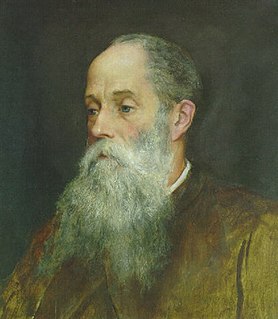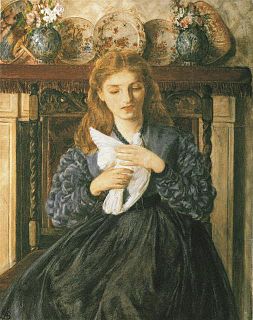Related Research Articles
Oliver Samuel Tonks was an American art historian, educator, and curator. Tonks was Professor of Art History Emeritus at Vassar College.

Marie Stillman was a British member of the second generation of the Pre-Raphaelite Brotherhood. Of the Pre-Raphaelites, she had one of the longest-running careers, spanning sixty years and producing over one hundred and fifty works. Though her work with the Brotherhood began as a favorite model, she soon trained and became a respected painter, earning praise from Dante Gabriel Rossetti and others.

Linda Nochlin was an American art historian, Lila Acheson Wallace Professor Emerita of Modern Art at New York University Institute of Fine Arts, and writer. As a prominent feminist art historian, she became well known for her pioneering 1971 article "Why Have There Been No Great Women Artists?" published by ARTnews.

John Roddam Spencer Stanhope was an English artist associated with Edward Burne-Jones and George Frederic Watts and often regarded as a second-wave pre-Raphaelite. His work is also studied within the context of Aestheticism and British Symbolism. As a painter, Stanhope worked in oil, watercolor, fresco, tempera, and mixed media. His subject matter was mythological, allegorical, biblical, and contemporary. Stanhope was born in Yorkshire, England, and died in Florence, Italy. He was the uncle and teacher of the painter Evelyn De Morgan.

Annie Louisa Swynnerton, ARA was a British painter best known for her portrait and symbolist works. She studied at Manchester School of Art and at the Académie Julian, before basing herself in the artistic community in Rome with her husband, the monumental sculptor Joseph Swynnerton. Swynnerton was influenced by George Frederic Watts and Sir Edward Burne-Jones. John Singer Sargent appreciated her work and helped her to become the first elected woman member at the Royal Academy of Arts in 1922. Swynnerton painted portraits of Henry James and Millicent Fawcett. Her main public collection of works are in Manchester Art Gallery, but individual works are also held in a few other English cities, as well as can also be seen in Glasgow, Dublin, Paris, and two in Melbourne, Australia. Annie was a close friend of leading suffragists of the day, notably the Pankhurst family.

The Lady of Shalott is a painting of 1888 by the English painter John William Waterhouse. It is a representation of the ending of Alfred, Lord Tennyson's 1832 poem of the same name. Waterhouse painted three versions of this character, in 1888, 1894 and 1915. It is one of his most famous works, which adopted much of the style of the Pre-Raphaelite Brotherhood, though Waterhouse was painting several decades after the Brotherhood split up during his early childhood. The Lady of Shalott was donated to the public by Sir Henry Tate in 1894 and is usually on display in Tate Britain, London, in room 1840.
Marilyn Jane Stokstad was an American art historian, educator, and curator. A scholar of medieval and Spanish art, Stokstad was Judith Harris Murphy Distinguished Professor of Art History Emeritus at the University of Kansas, and also served as Director of the Spencer Museum of Art.

Rebecca Solomon was a 19th-century English Pre-Raphaelite draftsman, illustrator, engraver, and painter of social injustices. She is the second of three children who all became artists, in a prominent Jewish family.

Love's Messenger is an 1885 watercolor by Marie Spartali Stillman in which a dove has just carried a love letter to a woman standing in front of an open window. She wears a red rose, and has just put down her embroidery of a blind-folded Cupid.
James "Jim" Bash Cuno is an American art historian and curator. Cuno currently serves as President and Chief Executive Officer of the J. Paul Getty Trust.

George Heard Hamilton was an American art historian, educator, and curator. Hamilton taught art history at Yale University and Williams College, as well as acting as Director of the Yale University Art Gallery and the Clark Art Institute.
Edgar Joseph Munhall was an American art historian and Curator Emeritus of the Frick Collection.
Peter Campbell Sutton is an American art historian. A specialist on seventeenth-century Dutch art, Sutton served as the Susan E. Lynch Executive Director and Chief Executive Officer of the Bruce Museum of Arts and Science from 2001 to 2019.
Maryan Ainsworth, who often publishes as Maryan Wynn Ainsworth, is an American art historian, author and curator specializing in 14th, 15th and 16th century Northern European painting, particularly in Early Netherlandish painting.

Michael J. Rosenthal is emeritus professor of the history of art at the University of Warwick. He is a specialist both in British art and culture of the eighteenth and early nineteenth centuries, and the arts of early colonial Australia.
Suzanne Boorsch is an American art historian, who specializes in Renaissance old master prints, as well as the art of Giorgio Ghisi, Andrea Mantegna, and Francesco Vanni. Boorsch is the Robert L. Solley Curator of Prints and Drawings at the Yale University Art Gallery.

Diana Elizabeth Edelman Kleiner is an American art historian and educator. A scholar of Ancient Roman art and architecture, Kleiner is the Dunham Professor of the History of Art Emeritus at Yale University.
Romita Ray Kapoor is an Indian-born American art historian, educator, and curator. Ray is currently Associate Professor of Art and Music Histories at Syracuse University.
Susanna Mary Avery-Quash is a British art historian, curator, and author.
References
- ↑ Casteras, Susan P. (1977). Down the garden path: Courtship culture and its imagery in Victorian painting (Thesis). hdl:10079/bibid/582554.
- ↑ "Susan Casteras | School of Art + Art History + Design | University of Washington".
- ↑ "Susan P. Casteras Married at Yale". The New York Times. 24 April 1976.